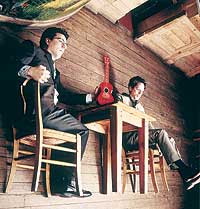
Construction linked with banks failed due to loss of credit and bankruptcy, leading to the building of Hoovervilles. Shanty houses were the usual living place for most Americans during the Great Depression. Hoovervilles is a more common name. Jobless people relied on the kind deeds of others for basic necessities such as milk and bread. Hoover believed that it was the job of good citizens to help the poor, not the government's. Soup kitchen's were the main dining place for Americans. The middle class was non existent, ranging from the extrememly poor to the extrememly rich. A man's day conisted of searching for a job, and when the search ended with no results, he felt it as a personal failure for his joblessness. Women even went on the hunt for jobs, despite how they were viewed. People had to sell usually expensive goods for significant less amounts. Even families' children were needed for labor. Miniorities, such as African Americans were negatively impacted even more so than whites. White men demanded that African Americans were forced out of their jobs untill, "every white man had a job". In such an economic depression, entertainment was valued. Radio and movie theaters provided a source of relief after a long day of hardships. Entertainment was the only enjoyable thing for people of the Great Depression.




